Bringing Home The Bacon
I told Anna to grab a jacket - unsure of what was going on outside, the suddenly unpredictable climate here produced rain yesterday along with some sunshine. I needed to go to the supermarket, and Anna is great insurance in cases like forgetting something important the moment after I walk out of the store – if I am alone, I have to make two trips, but with Anna, I can send her in while I wait.
"Do we have to take the cart?" Anna asked, obviously hoping for a quick trip
"We’re taking the cart."
How embarrassing for her! To be seen with her father toting along one of those carts that the old ladies use to carry their goods home must be a traumatic event for a teenager. To keep Anna’s mind off of it, I handed her my camera, and told her to shoot whatever she wanted to.
"Except for me pulling the cart," I added. "That’s off-limits."
The other thing I reminded her was that taking pictures inside of a business in Mexico is technically not legal unless you first get permission. If I had been the one with the camera there would have been trouble, or at least they would have wanted money for the privilege of photographing their shiny offerings. A fifteen-year old native, however, innocently practicing her hobby, would either be overlooked or else warned to stop.
Off to the market we went.
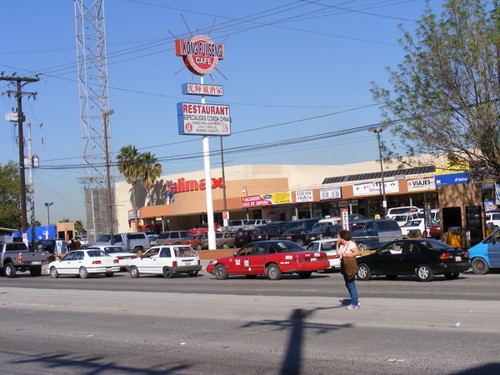
Even fifteen years ago, many supermarkets here were not well stocked nor regularly maintained. My initial perceptions, tainted by the clean markets with an abundance of inventory in the United States of America, were not based so much from what I was experiencing but more from what I had experienced. I saw the stores as dirty and inadequate. And they were, except that Tijuana has changed a lot in seventeen years. But back then there was no way to quickly build more supermarkets.

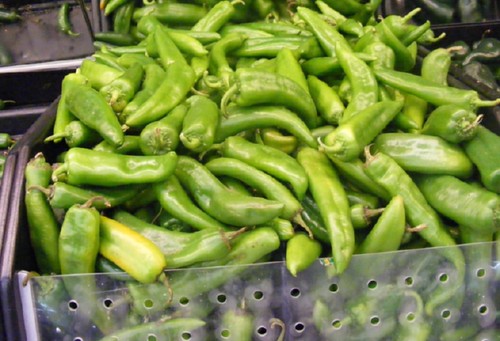
Imagine San Diego with no more than perhaps thirty supermarkets. Most of these supermarkets would become so overcrowded with customers that no matter how much labor it took in order to maintain the stores, it would quickly turn into a somewhat hopeless endeavor. And supermarkets operate on the principle of selling in large volume in order to lower their profit margin and be competitive, which precludes spending money unless it’s necessary. The solution, or at least the best solution, would be to build more stores.
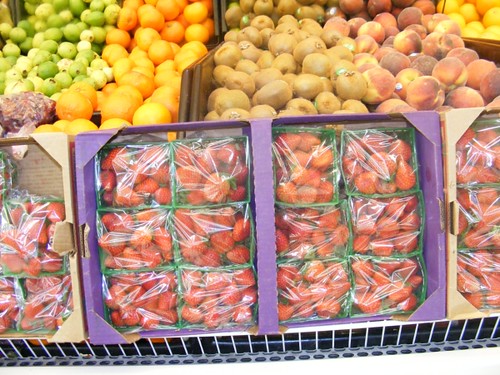
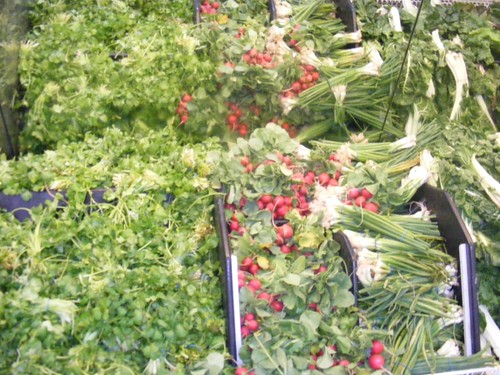
Tijuana was in a constant state of flux twenty years ago, acting as a leaky portal into the relatively stable economy on the other side of the big metal fence. The population grew at a rate where Tijuana’s infrastructure, already inadequate for the population that existed even twenty years prior, became so heavily burdened that every large storm was a disaster and systems designed to provide the population with basic necessities failed regularly. Mexico’s economy, for a wide variety of reasons – including an often-corrupt government and a lack of sound regulation in banking and finance – was in a constant state of crisis.
Building new stores was not an option for most of the supermarket chains. Who would finance them?
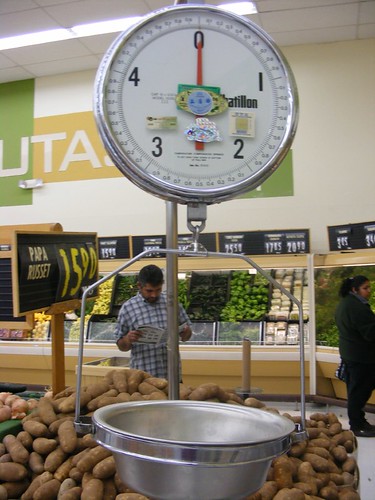
There will always be differences in supermarkets when comparing Mexico to anywhere else, most of which are cultural. Anna was born and raised in Tijuana, and while she’s seen supermarkets in the United States of America, she has not experienced the changes that I have in presentation concerning the stores here. I didn’t pay much attention to what she was up to, but I did catch her taking pictures of the dairy section.
"Why are you shooting that?"
"Look at all of this milk!" she said.
"Honey, most places have milk."
"Yes, but dad, look at all the milk!"
I shut up after that and concentrated on shopping. Anna, when not shooting pictures or poking fun at some of my purchases or not advising me on the brand of toilet paper that mom prefers, took every opportunity to use any mirror that she ran across in order to assure that her hair was still perfect. I never realized what a priority this is for a teenaged girl until recently. I always thought that the supermarkets used mirrors in order to promote the perception of inventory depth, obviously a mistake on my part.
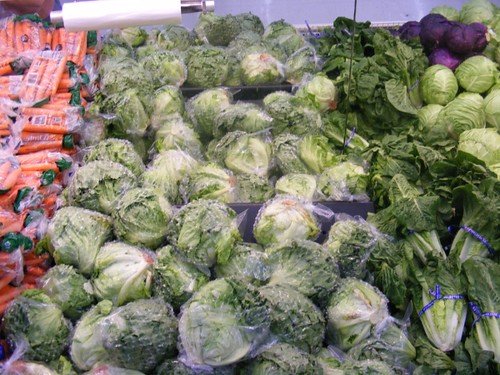
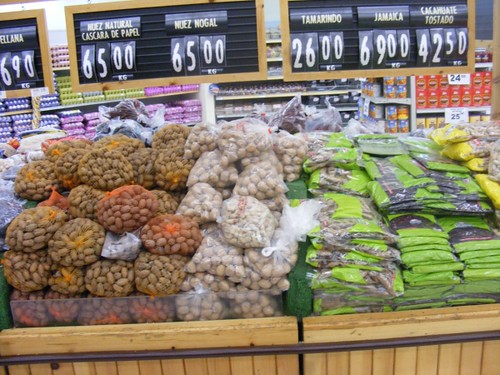
There are items, and large sections of all supermarkets in Mexico that I find endearing. While the markets have begun to prepackage many meat and poultry products, the butcher counters here can’t be beat. And cheeses, I have never seen so much fresh cheese before, the variety is amazing. Twenty years ago, I never imagined that there was such a thing as a style of chorizo, but there are so many styles I couldn’t even begin to explain it all in a sentence or two. These are the most profound differences compared to the supermarkets that I grew up with.
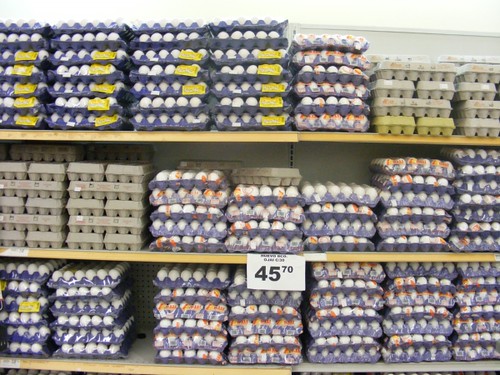
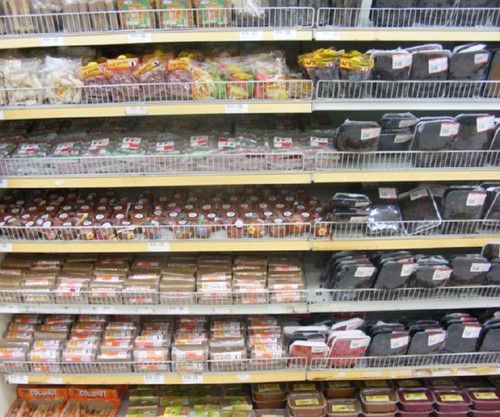
The supermarkets in Tijuana began to change during the approach to the twenty-first century, whether by coincidence or by the effects from several changes that occurred at the time. The big metal fence, once porous and relatively easy to traverse, became increasingly difficult to get through, around, or under, and Tijuana’s permanent population began to cement itself, and less migrants arrived for what once was simply a pit stop. Concurrently, the economy in Mexico began to stabilize, in large part due to the diligence and patience of the Zedillo administration. Banks and other financial institutions were scrutinized, and regulated, and financing became an option once again.


It didn’t take but a few years into the twenty-first century before supermarkets started popping up everywhere in Tijuana. Most are now clean, well stocked, and not so impossibly crowded as they once were. Notable exceptions still exist in the more urban areas, where building more stores is not so much an option due to unavailability of land. While the peso is fluctuating and the World economy is volatile and affecting Mexico as much as anyone, so long as this squall can be ridden out, Tijuana’s supermarkets every bit as wonderful and often times better than anywhere I have ever shopped.
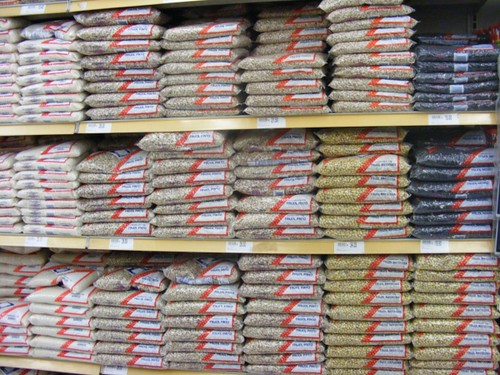
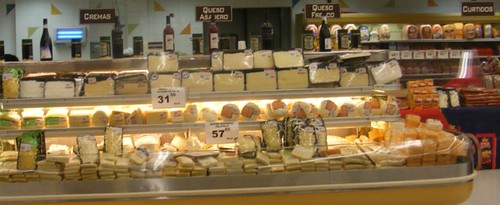
The last stop in the supermarket was the tequila section, where a young lady kept trying to assist me with my selection. This was nice of her, even if it is her job. Both me and Anna kept attempting to politely hint to her that I was fine left alone to browse the massive inventory and choose my own poison, but it wasn’t until I put a bottle in my cart that she stopped trying to be helpful. We found a short line - any other Saturday in the afternoon in that same supermarket around the time that Anna was born and we would have been in line for checkout for at least on hour. These days, it is the easiest thing about grocery shopping here.


Anna and me rolled our goods over to a counter near the exit where, upon entry, people are encouraged to check for storage anything that they happen to be bringing into the store. We were there for the cart, the embarrassing thing that I use when I don’t wish to carry forty pounds of groceries for a few blocks. We had to wait for an older man who came in to do some shopping, he was having the young lady behind the counter stash what he had brought in with him. Two stacks of aluminum cans, three very long and sharp and heavy steel rods (try bringing that into a supermarket in your country), and a minute later, we got our cart.
It’s nice to know that some things here will never change, no matter what the economy brings.
(Photos courtesy Anna M. L. de Dodd)


1 Comments:
You've been having a field day with the new camera. I guess we all do enjoy sharing/giving tours to a certain extent. Keep up the good work and continue to include pretty pictures to keep me amused!
Post a Comment
Subscribe to Post Comments [Atom]
<< Home